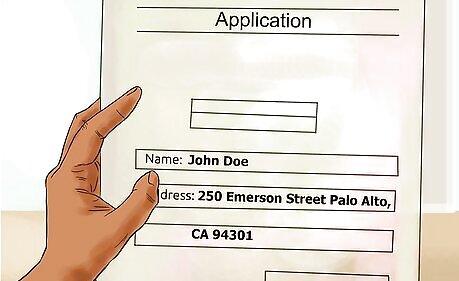
views
X
Research source
Checking If You Qualify

Confirm you don’t have prior felony convictions. You won’t qualify for pre-trial intervention if you already have felonies on your record. If you don’t know your criminal history, talk to your lawyer who can help you get it. For example, look for the following: felony deferred adjudications adjudicated felony offenses as a juvenile prior felony convictions

Check your prior criminal history. You will be ineligible if you also have other criminal offenses as part of your criminal history. For example, you must meet the following requirements: No criminal history involving offenses punishable by imprisonment within the past 10 years, regardless of disposition. No adjudicated misdemeanor offense as a juvenile within the past three years. No adult criminal history involving any offense that is similar or the same as your current offense, regardless of disposition.

Identify if your offense disqualifies you from the program. Some defendants cannot participate in pre-trial intervention based on their offense. For example, the following are disqualifying: public indecency under Chapter 43 sexual offenses under Chapter 21 resisting arrest offense offense involving delivery of illegal drugs or drug paraphernalia DWI (Driving While Intoxicated) where you injure another person DWI with a blood alcohol concentration of 0.15 or higher DWI where you refused field sobriety tests or urine tests

Talk to a lawyer. A qualified criminal defense attorney will know all of the details about the pre-trail intervention program in Williamson County. They can assess your situation and answer any questions. You can obtain a referral by contacting the Texas Bar Association. Visit https://www.texasbar.com/AM/Template.cfm?Section=Find_A_Lawyer&Template=/CustomSource/MemberDirectory/Search_Form_Client_Main.cfm and click on “Williamson” under Location. You can also call 1-800-252-9690 and get a half-hour consultation for $20. Make sure the lawyer practices criminal defense in Williamson County. Someone with expertise in divorces probably will not be much help.
Applying for the Program

Complete the application. You can download an application here: http://kencrainattorney.com/media/2494d30a9a6a95edffff807affffe905.pdf. Alternately, your lawyer can obtain an application for you. You may complete the application online. It will ask for the following information: name and personal information (such as address, birth date, race, Social Security number, etc.) attorney’s name cause number and offense (including the dates of the offense) employment information prior criminal history

Confess to the charge. You can’t get admitted into pre-trial intervention unless you accept responsibility for the crime. You will also have to provide a written explanation of the circumstances, including acceptance of responsibility for your actions. You must use your own words. Don’t have your lawyer draft this section for you. Also avoid trying to shift the blame onto other people. You won’t qualify for the program if you do. If you don’t want to accept responsibility, then don’t apply.

Have your attorney sign. Give the completed application to your lawyer, who must also sign the application. Also talk to your lawyer about what assessments you will have to undergo and the costs. Also talk about what will happen if you don’t successfully complete the pre-trial intervention program.

Take a drug test. You can’t get admitted into the pre-trial intervention program unless you take and pass a drug test. In fact, you must submit proof of a clean drug test with your application. Your lawyer will help you find a qualified lab. You must take a five panel drug test for the following: amphetamine cocaine marijuana methamphetamine opiates

Submit your application. Email the application to [email protected] at least 10 days before your first trial setting or within six months of your date of arrest (whichever is first). As the defendant, you should keep a copy of all paperwork for your records.

Receive tentative approval. The County Attorney will analyze the application and make a decision. Your lawyer should be notified. If you are approved, your attorney will receive a date for you to undergo a professional assessment. If you’re denied, you can appeal. You must send a request by email within 10 days of receiving the denial. Talk with your attorney about what information you should submit.
Completing the Program

Attend an interview. On the date specified, the defendant will meet with the assessment provider at the County Attorney’s Office. This person is a probation officer who specializes in pre-trial intervention. You will be interviewed and may have to answer questions about your past. Always answer honestly. You must pay $150.00 in cash or using a money order to the service provider. Depending on the results of the assessments, your application may be denied.

Pay restitution. You’ll have to make “restitution,” which means paying the victim for the damage you caused. You must present proof that you paid before you can sign an agreement to enter the pre-trial intervention program. Discuss with your attorney the amount of restitution you must pay, which might be set by the judge or County Attorney. Also talk about the proof you will need.

Execute a PTIP contract. You and your attorney will execute a PTIP Agreement with the prosecutor. As part of the agreement, you agree to forfeit any weapon that was seized as part of your criminal case. The same day you sign the agreement, you’ll meet with the Supervising Caseworker. You must pay this person a $360.00 PTIP fee along with a $225.00 court-appointed attorney fee (if applicable) using separate money orders.

Undergo drug and alcohol monitoring. As part of pre-trial intervention, you may be monitored using a SCRAM bracelet or an ignition interlock device that has a camera. SCRAM stands for Secure Continuous Remote Alcohol Monitor. It is usually an ankle bracelet that measures the alcohol content in your sweat every 30 minutes. You should be comfortable with this monitoring, otherwise you shouldn’t have entered the program. Your probation officer may also require that you take random drug tests.

Complete the program. Pre-trial intervention should last six months. During this period, you will have to fulfill many different obligations. For example, you must attend classes and complete community service requirements. Once you complete the program, the charges are dismissed. The number of classes you take, as well as the type of classes, depends on your criminal charge. You also must regularly report to the probation officer using email. Avoid committing new offenses. To complete the program, you must remain clean. If you commit another criminal offense, then you’ll be kicked out of the program and face prosecution.

















Comments
0 comment